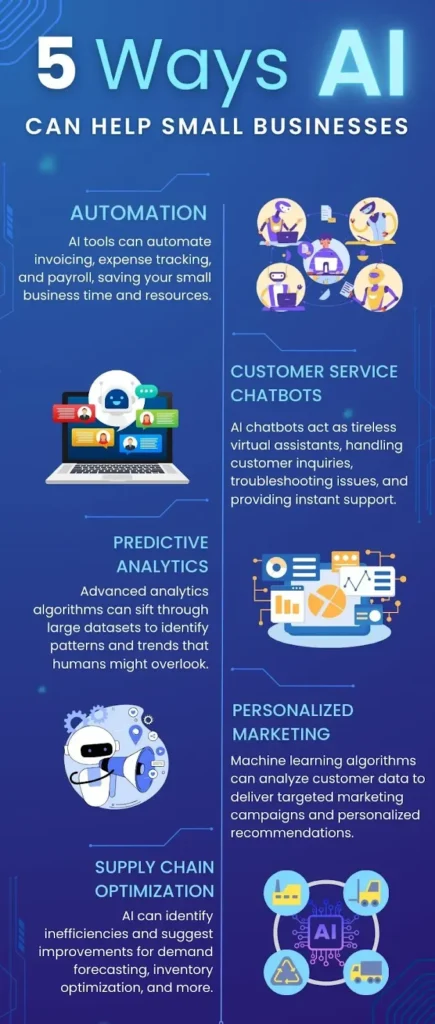Artificial Intelligence is no longer just a buzzword or a luxury for big companies. In 2025, even small businesses can leverage AI to automate repetitive tasks, enhance marketing, and improve customer service. Whether you’re a startup founder, freelancer, or managing a team of 10, using the right AI tools for a small business can help you scale faster and work smarter.
With countless options now available, we’ve narrowed down the best AI tools for small businesses that are affordable, beginner-friendly, and highly impactful.
Why AI Tools Matter for Small Businesses
Running a small business involves wearing multiple hats—marketing, sales, customer service, and operations. With limited manpower and budget, efficiency is crucial. This is where AI can be a game-changer.
From auto-generating emails to prospecting to analyzing customer data, AI tools help businesses save time and make better decisions.
- Boosts Efficiency
AI automates repetitive tasks like data entry, customer support, and inventory management, saving time and reducing human error. It helps businesses complete tasks faster and operate more smoothly. As a result, teams can focus on growth-oriented and creative tasks.
- Cost-Effective Growth
With limited budgets, small businesses can use AI for marketing, analytics, and operations without hiring large teams. This allows them to grow efficiently without overspending on resources. AI reduces the need for multiple tools by offering all-in-one solutions.
- Smarter Decision-Making
AI tools provide real-time insights and predictive analytics, helping small businesses make data-driven decisions. It empowers them to plan strategically and respond quickly to market changes. By identifying trends early, businesses can stay ahead of the competition.
.

By automating repetitive tasks, business owners can focus more on growth and strategy.
How to Use AI in Small Business
Many small business owners ask: “How to use AI in a small business without coding skills?” Thankfully, most modern AI tools are built with simplicity in mind. You can use AI to generate blog content, schedule social media marketing software posts, respond to customer chats, and automate your workflows. For example, a bakery can use AI to schedule online orders, while a marketing freelancer can generate email campaigns with a click. The possibilities are endless, and adoption is easier than ever.
AI can be used in small businesses to automate daily tasks, improve customer interactions, and boost marketing efforts. From writing emails and blogs with AI tools to using chatbots for instant customer support, the applications are endless. You can also automate workflows, analyze data trends, and personalize content for your audience

Top 7 Emerging AI Tools for Small Businesses in 2025
Let’s dive into the top AI tools for small businesses that are transforming how work gets done. These tools are selected based on ease of use, affordability, and business value—perfect for solopreneurs and growing startups alike.
1. Jasper AI 2.0
Jasper helps small businesses write blogs, product descriptions, emails, and ads in seconds using AI. Its templates and tone options make it easy to create on-brand content. You don’t need a writing team anymore—just a few prompts. It’s one of the best AI tools for small businesses focused on content marketing.
2. Narrato AI
Narrato AI combines AI content creation with workflow management and SEO optimization in one platform. It can generate blog posts, social media content, and product descriptions automatically, with its AI Content Genie feature creating weekly content batches without manual prompts. The platform includes built-in SEO scoring, team collaboration tools, and is designed for small businesses.
3. Predis.ai
Predis.ai helps small businesses create scroll-stopping AI ad creatives, videos, and social media posts in minutes, no design or editing skills needed. Just enter a product link or short description, and Predis generates ready-to-publish video or image ads tailored to your brand. With an easy drag-and-drop editor, you can tweak designs or text without starting from scratch. Whether you’re launching a product, running a sale, or trying to stay consistent on social media, Predis makes content creation fast and effortless.
2. Tidio AI Chatbot
Tidio’s AI chatbot allows you to chat with website visitors 24/7—even when you’re asleep. It answers FAQs, helps customers find products, and collects leads. Ideal for e-commerce, service-based businesses, and anyone who wants better customer service without hiring a support team. It’s a must-have AI tool for small businesses that rely on websites.
3. Pictory
Alt text: pictoryPictory helps you turn blog posts, text, or scripts into short videos using AI. It’s a perfect tool for creating reels, ads, or YouTube content without video editing skills. Small businesses can use it to make promo videos and repurpose content across channels. It’s efficient, fast, and totally beginner-friendly.
4. Zapier AI
Zapier has added AI to its already powerful automation system. It now suggests and builds workflows automatically based on your app usage. For example, you can create Zaps that post social updates, email invoices, or update your CRM software—all triggered by AI. A great AI tool for small business automation without coding.
5. Notion AI
Notion AI can summarize meeting notes, draft blogs, generate task lists, and assist with brainstorming. It enhances productivity for small teams or solo founders managing multiple projects. It’s especially useful for planning, documentation, and creative ideation. If you’re using Notion already, this AI upgrade is a no-brainer.
6. Lovo.ai
Lovo creates natural-sounding voice-overs in 30+ languages. If you’re creating content, product videos, or audiobooks, this tool can save tons of money on voice talent. Small business owners can produce professional audio content at scale without any audio editing experience.
7. Levity
Levity lets you build custom workflows using AI—like sorting emails, classifying images, or tagging feedback. You don’t need developers or advanced tools. It’s great for repetitive, admin-heavy tasks that slow you down. A hidden gem for small business automation in 2025.
8. Martal AI SDR
Martal AI SDR is an AI-powered sales assistant that helps small businesses book more meetings without hiring a full sales team. It analyzes over 220M+ contacts and real-time intent signals to find ideal buyers, writes personalized outreach messages, warms up your domain, rotates inboxes, and automates follow-ups.
Unlike basic automation tools, Martal AI SDR learns from every campaign and adapts like a real sales rep—making it great for solopreneurs and growing teams who want more qualified leads but don’t have time to prospect. It brings enterprise-level sales intelligence to small business budgets.
Tips for Choosing the Right AI Tools
Focus on tools that align with your business goals, integrate smoothly with your existing systems, and offer strong data privacy features. Always check for scalability, ease of use, and reliable customer support before committing.

Choosing the right AI tools depends on your goals—do you need to save time, improve marketing, or automate support? Always start with a free trial to test usability. Look for tools that integrate with platforms you already use like Shopify, Gmail, or Slack.
Don’t overwhelm your team—start with one tool, train your staff, and scale as you grow. The right AI stack can dramatically boost efficiency in your small business.
- Start Small with One Tool
Begin by solving a specific problem—like customer queries—with a chatbot like Tidio or Chatfuel before expanding to other tools. - Repurpose Existing Content
Use AI video tools like Pictory or Lumen5 to turn blogs or FAQs into social media content, saving time and boosting engagement. - Track Key Metrics
Measure impact by tracking metrics like response time, engagement, or lead conversion to understand what’s working.
- Choose User-Friendly Platforms
Select AI tools that are built for non-tech users. Most modern platforms offer drag-and-drop features or pre-built templates. - Integrate AI with Existing Workflows
Ensure the AI tools you choose can connect easily with your current systems—like email, CRM, or eCommerce platforms—to streamline operations without disrupting your workflow.
Future of AI in Small Businesses
As AI continues to evolve, we’ll see even more user-friendly, affordable tools built for small businesses. Expect smarter AI agent platforms, hyper-personalized marketing assistants, and automated analytics reports. The key is staying adaptable.
Small businesses that embrace AI early will have a big edge in speed, customer experience, and innovation, especially when leveraging agentic personalization to tailor interactions and product recommendations.
- No-Code AI Tools: Easily create automations and workflows without writing any code.
- Smarter Predictions: AI will offer actionable insights like sales trends and customer behavior forecasts.
- Voice & Chat Interfaces: AI assistants will manage calls, chats, and even voice commands to improve accessibility.
- Proactive Recommendations: Get real-time suggestions based on customer data, inventory trends, and performance metrics.
Conclusion
In 2025, AI tools for small businesses are more powerful and accessible than ever. Whether you want to automate your workflow, create content, or support customers round the clock, there’s an AI solution
for it. Start by picking one or two tools from the list above and test them in your business. With smart adoption, AI will help you work less and grow more.
FAQs
Q1. Are AI tools expensive for small businesses?
Many tools offer free plans or affordable monthly subscriptions perfect for small teams or startups.
Q2. Can I use AI tools without technical skills?
Absolutely. Most of the best AI tools for small business are designed with user-friendliness in mind and require no coding.
Q3. What’s the best way to use AI in a small business?
Start with marketing, customer support, or automation—areas where AI can deliver quick wins with minimal learning curve.
Q4. What if I’m just starting my business—should I use AI?
Yes. Starting with AI early gives you a competitive edge and helps you build efficient systems from day one.
Q5. Will AI replace human jobs in small businesses?
AI is designed to assist, not replace. In small businesses, AI handles repetitive or time-consuming tasks—like scheduling, replying to FAQs and writing drafts.

